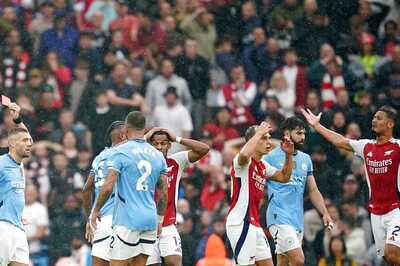
views
Rome: The leader of Opus Dei, the conservative Catholic movement depicted as a murderous cult in The Da Vinci Code has said the phenomenon surrounding the book-turned-film had at least given the church an opportunity to talk about the truth of Jesus Christ.
"In this amazing moment that we are living in, we need to talk about Christ and always keep him in mind in our personal life and in our work," Monsignor Javier Echevarria said at Opus Dei's world headquarters in Rome on Wednesday.
The interview, on the day of the film's release at the Cannes Film Festival was part of Opus Dei's campaign to refute through unprecedented transparency what it and the Catholic Church say are errors and offenses to the faithful in the Dan Brown work.
In an odd coincidence, the film's release came on the 14th anniversary of the beatification of the Opus Dei founder, Josemaria Escriva de Balaguer.
In addition, Pope Benedict XVI on Wednesday promoted an Opus Dei bishop in Argentina, in yet another indication of the favor that Opus enjoys at the Vatican.
"I am particularly happy today for many reasons, on the one hand because the life of a Christian is founded on the supernatural and human peace and happiness, and on the other hand because today coincides with the anniversary of the beatification of Saint Josemaria Escriva, who was a giant in the history of the 20th century," Echevarria said.
The Da Vinci Code espouses the theory that Jesus married Mary Magdalene and had children, and that their blood line survives today. It puts the church and Opus Dei at the center of a conspiracy to cover up the supposed secret.
As part of its media blitz to counter the theory, Opus Dei hosted a daylong media visit on Wednesday to a vocational school it runs in a working class neighborhood of the Italian capital to show off its work helping train young people to be mechanics, electricians and chefs.
Journalists were invited to view a documentary on the movement and to tour the school, which like all Opus Dei residences is strictly segregated by sex: The boy's school offers watch making and computer classes; the girl's school which is accessible by another entrance around the corner, offers hospitality courses.
Opus Dei's message was that a lot of good has actually come out of the film, because it had generated interest in Christianity and given the church an opportunity to teach the truth about the faith and Opus Dei's true mission, which is that everyday work is an occasion to grow spiritually closer to Jesus.
The film's lukewarm reception among critics at the Cannes Film Festival also brought some smiles to Opus Dei members, who cited the fact that laughter rippled through the screening room during a melodramatic climax of the film.
"The laughter explains everything," said Michele Crudele, director of the Opus Dei-run Centro Elis vocational school.
PAGE_BREAK
Vatican Radio also noted the less-than-positive reviews, headlining its report on the Cannes festival by saying The Da Vinci Code was "roundly criticized."
The number two official in the Vatican's Congregation for the Doctrine of the Faith, Monsignor Angelo Amato, told Vatican Radio that Brown's work was a "true and proper defamation of the church intended to discredit it."
He said he didn't think the Vatican would take any further action against it but would continue defending church doctrine. "But churches and Christian communities should speak louder, that is shout the truth from roofs as the Gospel says to stem the lies," he added.




















Comments
0 comment